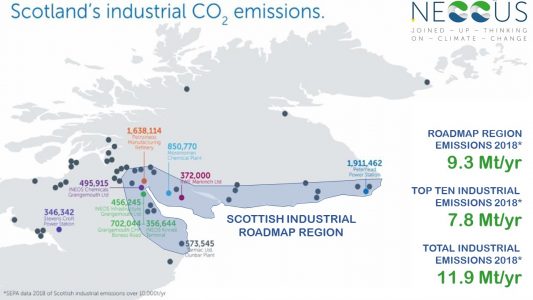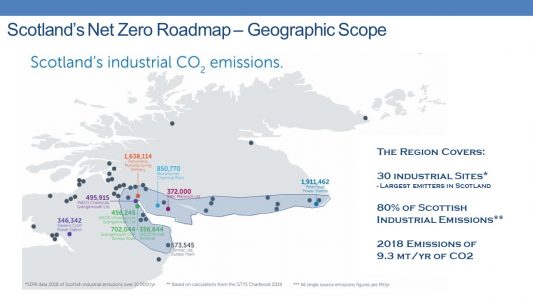Two Scottish decarbonisation projects have attracted seed funding from UK Research and Innovation to conduct further work on CO2 reduction programmes, aimed at helping Scotland meet its ambitious Net Zero target by 2045 and the UK to meet its target by 2050.
One, led by Aberdeen based, clean energy consultancy Pale Blue Dot Energy is to receive around £100,000 to develop its plans for deploying CO2 gathering and shipping infrastructure to decarbonise the industrial cluster in the Central Belt of Scotland; while a second partnership led by NECCUS, the North East Carbon Capture, Utilisation and Storage Alliance, attracted a similar amount to develop a roadmap. This will set out in detail how low carbon and Net Zero industrial clusters can be achieved in the coming years.
Crucially, the funding allows both organisations to progress to the next round of the UK Government’s Industrial Strategy Challenge Fund. This means they are eligible to compete for further funding, for which £131m is available for the deployment element of the industrial strategy, while £8m is available for the roadmap work.
NECCUS was launched in 2019 to ensure delivery of numerous low carbon projects across Scotland, it partnered with leading academic groups and industry for the roadmap work. Pale Blue Dot partnered with Costain and Doosan Babcock among others for the deployment work.
Minister for Energy, Connectivity, and the Islands Paul Wheelhouse said, ‘I am very pleased to see two Scottish CCUS projects, co-ordinated by Pale Blue Dot Energy and NECCUS, successfully winning funding through the Industrial Decarbonisation Challenge Fund. Scotland is delivery on its world-leading emissions reduction targets and ambition to be Net Zero by 2045, and CCUS is a vital component of our energy transition which supports industrial decarbonisation.
‘The Climate Emergency remains, and it is therefore vital we have a strong, green economic recovery from the COVID-19 pandemic. Because these technologies are critical to the essential energy transition and to ensuring a just transition, we are supporting the development and implementation of CCUS technologies, including continued Scottish Government backing for Pale Blue Dot Energy and NECCUS.’
Martin Edwards, Pale Blue Dot Energy’s Commercial Director said, ‘We are delighted to have been awarded this funding to help develop our plans for Scotland’s Net Zero Infrastructure project. This infrastructure is essential to meet the challenge of cost effectively and urgently decarbonising our industries and creating exciting clean growth opportunities.’
Mike Smith, NECCUS CEO said, ‘This great step forward for us. Decarbonising our economy is a huge, but vital project and we need to have an ambitious and robust view of how to achieve it. The roadmap will help tell us what we have to do and by when.’
Sian Wilson, Senior Manager, Crown Estate Scotland which provides the rights for CO2 storage and is an active supporter of both projects said, ‘The end goal for the work is that Scotland can offer the next generation a truly sustainable future with good quality jobs created from clean, inclusive, growth across a range of sectors. This is something we wholly support and are therefore pleased to be involved in this project.’
ENDS
NOTES:
Background – Industrial Strategy Challenge Fund Projects
The projects being funding are focused on helping the UK achieve net zero emissions by 2050 as part of the Industrial Decarbonisation Challenge, a key component of the UK Government’s Clean Growth Strategy.
Through this government is committed to deploying technologies like carbon capture and hydrogen networks in industrial clusters, supporting the Industrial Clusters Mission to establish the world’s first net zero industrial cluster by 2040.
The first phases of the two competitions are as follows:
- Deployment – In the first phase of this programme, UK businesses applied for a share of £1 million to develop plans for decarbonising an industrial cluster.
- Roadmaps – Six businesses have been awarded shares of £1 million to prepare plans for their journey to achieving low carbon and net zero industrial clusters.
Deployment – Scotland’s Net Zero Infrastructure project:
Project leader: Pale Blue Dot Energy working
Partners: NECCUS, Doosan Babcock Ltd and Costain.
Duration: 4 months (April – July), culminating in an ISCF Phase 2 submission
Roadmaps – The Scottish Net Zero Roadmap project:
Project leader: NECCUS
Partners: Edinburgh University, Strathclyde University, the Oil & Gas Technology Centre, SGN, Costain, Pale Blue Dot, Optimat and ES Catapult (under contract)
Duration: 4 months (April – July), culminating in an ISCF Phase 2 submission
Acorn CCS is strategically designed to repurpose legacy oil and gas infrastructure and make best use of Scotland’s excellent geology for CO2 storage. Modest quantities of existing CO2 emissions from the St Fergus gas terminal in North East Scotland are used to kickstart a CO2 transport and storage system capable of dealing with over 2 million tonnes of CO2 per year. An important catalyst for clean growth opportunities in Scotland, and in regions where CO2 transport and storage is limited, Acorn can help transform our carbon intensive industries and sustain jobs. Acorn CCS unlocks the carbon capture and storage and hydrogen infrastructure essential for meeting the Scottish and UK Government Net Zero targets.
For more information about Pale Blue Dot Energy’s deployment award contact:
media@pale-blu.com
For more information about the NECCUS roadmap award contact:
max.prangnell@commsalliance.co.uk or call 0773 436 1055



